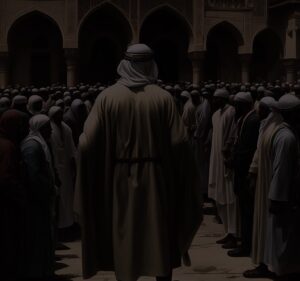Umar ibn Al-Khattab, the second Caliph of Islam, stands as one of the most influential figures in Islamic history. Known for his extraordinary combination of physical strength, unwavering piety, and commitment to justice, Umar’s legacy continues to inspire Muslims worldwide fourteen centuries after his death.
The Lion of Islam
Before his conversion to Islam, Umar was known for his imposing physical presence and fierce temperament. Tall and powerfully built, he was a skilled wrestler and warrior among the Quraysh tribe. His physical strength was legendary—it is said that when he walked, he walked with purpose, and when he spoke, his voice commanded respect.
Upon embracing Islam, Umar channeled this strength into service of the new faith. When Muslims had been worshipping in secret, it was Umar who declared, “We shall pray at the Ka’bah publicly,” leading a procession of believers to pray openly at Islam’s holiest site for the first time. His conversion was so significant that the Prophet Muhammad himself remarked, “Islam became mighty when Umar accepted it.”
Uncompromising Piety
What truly distinguished Umar was how he transformed his fierce nature into deep devotion to Allah. Despite his position of power as Caliph, Umar lived an austere life that reflected complete submission to God. He would often be seen wearing patched clothing, sometimes with up to fourteen patches on his single garment.
Numerous accounts describe Umar spending his nights in prayer, sometimes weeping in fear of Allah until dawn. During his caliphate, he was known to patrol the streets of Medina at night, carrying supplies on his own shoulders to personally deliver food to the needy. When questioned why he, as the leader of the growing Islamic state, would perform such tasks himself, he famously replied that he would be held accountable by Allah for every person in his realm.
Justice and Righteousness
Perhaps Umar’s most enduring legacy was his commitment to justice. He established the first formal Islamic judicial system and personally ensured that justice was administered fairly regardless of social status. Under his leadership, the principle that all people stand equal before the law became a cornerstone of Islamic governance.
One famous incident illustrates this commitment perfectly: When an Egyptian Copt complained that he had been struck by the son of Amr ibn al-As (the governor of Egypt), Umar summoned both father and son to Medina. He then handed a whip to the Egyptian and instructed him to strike the governor’s son as retribution, saying the immortal words: “Since when have you enslaved people who were born free?”
Umar’s sense of responsibility was so acute that he once said, “If a camel dies of neglect on the banks of the Euphrates, I fear Allah will hold me accountable for it.” This statement encapsulates his understanding that leadership in Islam is not a privilege, but a heavy trust.
Administrative Brilliance
Umar’s ten-year caliphate (634-644 CE) saw the rapid expansion of the Islamic state. Yet despite conquering vast territories including Syria, Egypt, and Persia, he established systems of governance that were remarkably fair and effective. He instituted a census, organized a treasury (Bayt al-Mal), established garrison cities, and created a welfare system that cared for the poor and vulnerable.
Despite overseeing an empire, Umar maintained personal accountability and simplicity. During a severe famine, he refused to eat better food than what was available to the poorest citizens, resulting in a noticeable darkening of his skin from hunger. When questioned about his appearance, he replied, “How can I care about myself when there are people suffering?”




